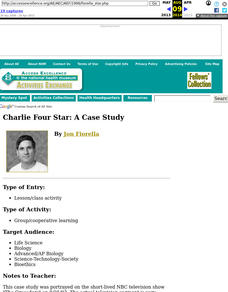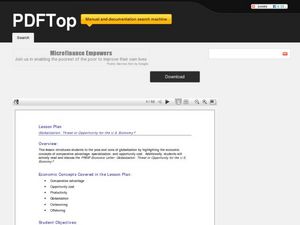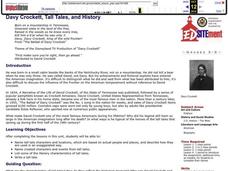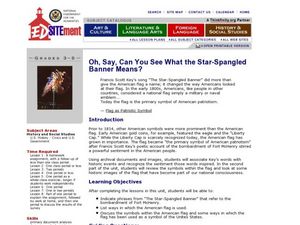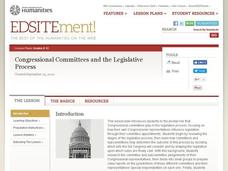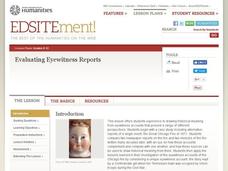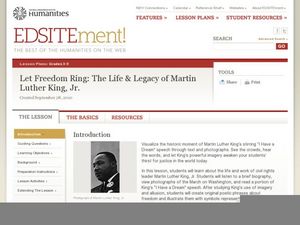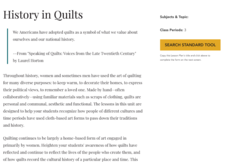Curated OER
Terrific Trees
In this rainforest worksheet, students read about why the remaining trees in the rainforest are important. Students also answer 9 True/False questions about the reading.
Council for Economic Education
What Do People Want to Wear?
Who doesn't love fashion, especially when it can be applied to economics, supply, demand, market trends, and price equilibrium. Curious young consumers examine market scenarios to determine their effect on the demand and price for...
Curated OER
Charlie Four Star: A Case Study
Engage in a class debate dealing with the allocation of organs to those waiting for a transplant. How do they decide who gets a transplant and who doesn't? Learners attempt to determine what is fair for the individual requiring an organ...
Curated OER
Globalization: Threat or Opportunity for the U.S. Economy?
Students study the pros and cons of globalization. They highlight the economic concepts of comparative advantage, specialization, and opportunity cost. They read and discuss the "FRBSF Economic Letter: Globalization: Threat or...
Curated OER
History Fair
Students create a History Fair. They examine the National History Day Competition and are encouraged to participate.
Curated OER
Bartering, an Early Form of Interdependence
Students explore the the benefits and problems associated with a barter system in the Colonies and trace its relationship to the development of interdependence that this system creates. An experience of bartering is created in this lesson.
Curated OER
Let the Campaign Begin
Students examine the many steps involved in the electoral process. They examine past president's campaigns and write an announcement speech for the candidate of their choice.
Curated OER
The Changing Meaning of "Due Process"
Learners examine the United States Constitution and how the application for due process differs in two amendments. They research the changing definition of the term since the Civil War. They use the internet to research press coverage of...
Curated OER
What's the Difference Between Procedural and Substantive Due Process?
High schoolers discuss the difference between substantive and procedural due process. They research the uses of due process on the internet and books. They also discuss cases involving students and due process.
Curated OER
What is Due Process Anyway?
Students examine the term due process and its historical origins. They compare and constrast the requirements of due process in the United States Constitution and the Indiana Constitution. They also discuss the difference between...
Curated OER
Born on a Mountaintop? Davy Crockett, Tall Tales, and History
Young scholars compare and contrast the details from the life of the real David Crockett and the legendary folk hero he later became. They identify the characteristics of a tall tale and follow a rubric to create a tall tale of their own.
Curated OER
Listening to History
Students consider the insight to the past that oral histories can provide. They, in groups, analyze oral histories, prepare to interview a family member on their recollections of a historical event and then write a historical narrative.
Curated OER
Oh, Say, Can You See What the Star-Spangled Banner Means?
Learners research the historical inspiration for the lyrics of the "The Star Spangled Banner". They explore websites, read articles and analyze poetry in an examination of America's patriotic symbols and history.
Curated OER
Argument in an Athenian Jail: Socrates and the Law
Young scholars read and discuss Socrates's "Crito" and examine the arguments he made supporting his own death penalty. They consider the still-relevant debate between the rights of the individual and the rule of law.
National Endowment for the Humanities
On This Day With Lewis and Clark
Walk in the footsteps of Lewis and Clark as they discover the wonders, beauty, and dangers of the American frontier. After gaining background knowledge about Thomas Jefferson and the Louisiana Purchase, young explorers use primary...
Curated OER
Congressional Committees and the Legislative Process
Students consider the importance and influence of congressional committees. They research congressional committee assignments, jurisdictions and responsibilities as illustrations of the basic principles of American federalism.
National Endowment for the Humanities
Cultural Change
High schoolers research the passage of the 19th Amendment as an illustration of the mutual influence between political ideas and cultural attitudes. They also read the Seneca Falls Declaration and explore the cultural shifts it both...
Curated OER
Evaluating Eyewitness Reports
Students consider the advantages and disadvantages of eyewitness accounts as records of history. They research several accounts of the Great Chicago Fire of 1871 and then compare and contrast each version to arrive at a final picture.
Curated OER
Let Freedom Ring: The Life & Legacy of Martin Luther King, Jr.
Students use text and photos to visualize the delivery of Dr. Martin Luther King, Jr.'s historic "I Have A Dream" speech. They analyze Dr. King's speech for examples of imagery and allusion and create original poetry and illustrations...
National Endowment for the Humanities
History in Quilts
Learners investigate the use of cloth-based art forms intended to pass down traditions and history. They research types of quilts, quilt characteristics and then identify how Freedom Quilts were historically used in the US.
Curated OER
The Preamble to the Constitution: How Do You Make a More Perfect Union?
Learners analyze the Preamble of the Constitution and identify the historical context that led to its wording. They, in groups, interpret phrases from the Preamble, examine relevant court cases and create illustrations for their portion...
Curated OER
Exploring Arthurian Legend
Students investigate the evolution of the King Arthur stories and analyze them as a window into the culture that preserved them. They trace the legends through their earliest versions through medieval and Victorian times and into the...
Curated OER
Why Do We Remember Revere? Paul Revere's Ride in History and Literature
Middle schoolers examine primary documents regarding Paul Revere's ride and its role in the Revolutionary War. They consider how Revere's role has been written about by Longfellow and others and discuss the discrepancies between accounts.
National Endowment for the Humanities
Hamlet Meets Chushingura: Traditions of the Revenge Tragedy
Young scholars read texts, view film and video and conduct research in an analysis and comparison of Shakespeare's "Hamlet" and the Kabuki piece "Chushingura". They focus their analysis on the theme of revenge.




